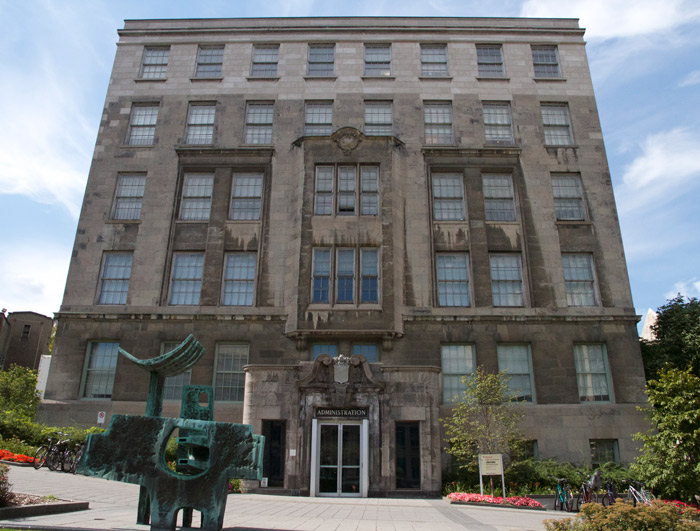On Oct. 6, the McGill Board of Governors (BoG) held its monthly meeting, during which they heard an update from Principal Suzanne Fortier on her recent activities and a presentation from the Students’ Society of McGill University (SSMU) executives outlining information about their organization. The meeting was interrupted by members of Divest McGill, forcing an early adjournment.
Tuition deregulation
Fortier informed the board of her recent activities, which include her work on external relations and government lobbying. Fortier’s update included a discussion on her advocacy for tuition deregulation, which would allow McGill to keep funds from student tuition that currently are handed to the provincial government to be used in equalization payments across universities.
“When it comes to Canadian, non-Quebec residents […their] fees are higher and the [provincial government claims] a big portion of those fees and puts them into equalization [payments],” Fortier said. “When it comes to international students […the government] imposes significant fees, [then take those] fees and redistribute them in the system.”
Fortier has been lobbying the Quebec government to allow McGill to keep those extra fees from out-of-province and international students, and for universities across Quebec to determine for themselves how they will use these fees.
“When […an international student] pays $30,000 to come to McGill, let’s keep that money at McGill, because it’s very hard to explain to our students why the money they’re spending here is going somewhere else […],” Fortier said. “ Diminishing or decreasing the student to faculty ratios, more opportunities for our students to be involved in internships, better student services—whether its academic services or personal health […] this is what we would do with this money [….] My advice to the government is don’t adopt a one-size-fits-all approach and impose one model on all universities. The beauty of the Quebec system is we’re all different.”
SSMU presentation
SSMU President Ben Ger and Vice-President (VP) University Affairs Erin Sobat gave the board a presentation outlining basic information about SSMU. According to BoG Chair Stuart Cobbett, the presentation was part of the board’s regular education agenda at each meeting.
“It has been our habit in meetings to have a presentation, typically it’s been on an academic subject […], but this time we thought it would be helpful to do this so you can hear from the students themselves,” Cobbett said.
The presentation, which outlined the composition and activities of SSMU, drew concerns by the board over equal gender representation on the council and in the executive. Ger responded by discussing research the Society has started into equity in representation.
“On the executive level, there definitely is a problem with [equal gender representation], and that is going to be looked at in the equitable governance reform that we’re looking at right now,” Ger said. “[We’re] looking at the different ways that our government right now is accessible to different groups on campus.”
Interruption by Divest McGill
Members of Divest McGill disrupted the meeting to address the board, which prompted members to adjourn the meeting early. According to Jed Lenetsky, a member of Divest McGill who was also present at the meeting, the group had often interrupted BoG meetings, but this was the first time the board has adjourned in response.
“Divest McGill interrupting board meetings isn't something new […] we’ve been doing [it] for the past year, mainly due to the fact that the McGill [BoG] is largely inaccessible to the student body and in our dealings with the administration we have never really had the formal chance to talk to members of the [BoG],” Lenetsky said. “So we began using the open sessions of the [BoG] meetings to interact with those members [….What] was new was the fact that [the BoG] decided to adjourn the meeting once we started speaking. Normally what happens is we'll speak and they'll listen and then they'll just continue their meeting.”
The interruption was intended to bring events from the recent open forums on sustainability to the board’s attention.
“We were talking about the open forums on sustainability that occurred for the past couple of weeks […],” Lenetsky said. “Throughout most of the summer, members of Divest McGill […] have been reaching out to the [BoG] in an effort to get them to attend. Only two members of the [BoG…] attended one of the sessions, so we thought it was important for members of the [BoG] to hear from the McGill community in person and hear what happened at these forum that they missed.”
According to Ger, the meeting continued after the adjournment in another location within the James Administration Building. At the continued session, the BoG discussed the disruption.
“The reconvened meeting went on to talk about the rest of the items on the public agenda […] but the large portion of the conversation was more so around the event that had just happened,” Ger said. “A lot of the […] governors were talking about how it was an escalation from last year that was noticed, and how we can maybe go about fixing those problems in the future to make sure there wasn't that level of interruption.”
Ger stated that changes can be made to the BoG structure that will allow for students to voice their concerns in a way that is constructive and non-obtrusive.
“I [suggested] that instead of looking into a way that we could stop people [interrupting…] what could work better is if we could have a question and answer period so people could come in at the end of an agenda [to] ask questions […],” Ger said. “[In] the end, the conclusion was that the nominating governance and ethics committee, which is a committee on the [BoG], would look into the board best practices.”









